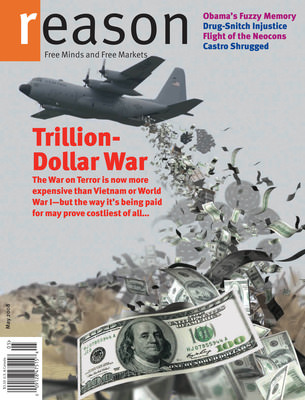Conservative #NeverTrump Republicans Are Already Eating Their Own
It hurts to admit that Trump isn't alien to conservative culture - he's its near-perfect expression.

It's expected by most people who aren't dazzled by the glints of gold from everything associated with Donald Trump that he will lose decisively tonight to Hillary Clinton. And then probably pitch a fit for the next couple of weeks.
The Wall Street Journal's Bret Stephens was a vocal critic of Trump and in his last pre-election column he lays into what he says are lame, weak conservative intellectuals and politicians who failed to join him and others in denouncing the short-fingered vulgarian.
Revealed: That moral clarity and moral equivalence have become interchangeable concepts in today's GOP. The same Republicans who pontificated throughout the 1990s about restoring honor and dignity to the Oval Office are now eager to rent that office to a man who boasts of his own sexual predations. Why? Because Bill Clinton already went there….
Also revealed: That conservatives who once took umbrage at being called racist or anti-Semitic are now happy to flirt with white nationalism. That a party of self-described strict constructionists sees nothing amiss in Mr. Trump's call to rewrite the 14th Amendment. That the ability of Mr. Trump and his supporters to hurl insults at their critics is only exceeded by their exquisite sensitivity when they are insulted back. That a reset with Russia is a fiasco when executed by Hillary Clinton but evidence of fresh foreign-policy thinking when proposed by Mr. Trump….
Most conservative intellectuals have proved incapable of self-examination or even simple observation. Donald Trump is a demagogue. Period. The fervor of his crowds recalls Nasser's Egypt. His convictions are illiberal. His manners are disgusting. His temper is frightening. It ought to have been the job of thoughtful conservatives in this season to point this out, time and again. If they can't do that, what good are they?
George Orwell said that "to see what is in front of one's nose needs a constant struggle." The Big Reveal of 2016 is that most conservatives failed the Orwell test. On Tuesday we'll learn if American voters can do better.
This is all well and good (and as a hawk's hawk who has never fully moved past the Cold War, Stephens is particularly exercised by Trump's accidental suggestion that maybe NATO and relations with Russia need to be rethought since 1991). But it really lets conservative Republicans writ large—including many of the folks at the Wall Street Journal—off the hook kind too easily.
The plain fact is that Trump didn't steal the Republican Party or the affections of conservative "intellectuals" (many of whom are simple partisans who are hardly worthy of the term). He's the culmination of a decades-long dumbification of a party that once used to pride itself as being the group (relative to Democrats, at least) with all the big ideas. Trump isn't the start of anything, he's the logical conclusion of a process that started sometime during the Reagan years that was far more about blind rage and partisanship than anything at all related to serious governance and allegiance to limited government ideals.
Newt Gingrich, the philosopher-king of post-Cold War conservatism, has always been the third-rate blowhard he is now on Fox News, where he talks with such latter-day Bill Buckleys as Sean Hannity and Judge Jeanine (Buckley, of course, was coasting intellectually much of his life, defending Joe McCarthy, racial segregation, and the quarantining of AIDS patients at various stages of his career; about the only time he was ahead of the curve was in denouncing the Iraq invasion as a mistake).
Indeed, what are we to make of the Republicans during the long reign of George W. Bush, when he spent more and more money we didn't have on everything we didn't need, from war to drugs for rich old folks to No Child Left Behind? That Bush and his party justified the Iraq War on specious grounds and then prosecuted a dumb war poorly was bad enough, but Bush and his apparatchiks went further, by financing their war via emergency supplemental funding bills that precluded open debate and defending the indefensible (torture, illegal surveillance). When the financial crisis came, Bush and Republicans (and the Wall Street Journal editorial board) supported TARP and semi-legal bailouts of whole industries. The Journal's editorial page, among virtually all others, went along with that.

This isn't to relitigate the past. The point is that Trump was able to barge into a party that had never even come close to living up to its starkly libertarian rhetoric of smaller, better government. Instead, unprincipled GOP pols, supported by champions in the media, were able to grow spending, regulations, and poorly conceived and incompetently executed wars without much of a backlash from the very people that Stephens is calling on the carpet now. There was always a reason to let this or that stupidity go, right, because in the end beating Democrats was more important than anything as trivial as principle? The result? The GOP became "stale and moss-covered" as Rand Paul put it a few years ago, and faced with declining appeal to a younger and a more-diverse America. That was already in place before Trump was on anyone's radar.
Sure, Trump is an awful person and candidate, and he's not even remotely serious as a policy wonk much less a prospective president. I too would be embarrassed if he was the standard-bearer of my party and movement. But let's get real: He's a pretty damn solid conservative and Republican. He brought his position on abortion into line in order to run for president and he's perfectly vile on immigration (the WSJ is a great and sadly rare exception to the reining orthodoxy on the right, which is all for closed borders and hissing in the direction of Latinos and other newcomers). He has pledged to spend (borrow) lots of money to continually upgrade the military and he hasn't been slow about talking about projecting American force willy-nilly (which is to say, Bush style). He's in favor of torture when it's called for, holds old-age entitlements sacred, and is brazenly anti-intellectual (while also constantly invoking his Ivy League B.A.). Just like the "reformocons," he will use the tax code and subsidies for his preferred policies, such as child-care for middle-class families and paid parental leave.
The few apostasies that Trump declares—he doesn't seem to give a shit about religion, or gay marriage and other conservative social issues—are hardly the most unattractive things about him. Indeed, his willingness to say occasionally that our foreign policy isn't working so well (and the Obama's is a continuation of Bush's) shows that even a nearly completely ignorant candidate can stumble into truth.
Even on the longshot that Trump actually wins, the GOP has a lot of hard work ahead of it. It can't win the presidency with any regularity because it has been full of malarkey the entire 21st century when it came to living up to its small-government rhetoric. When given the chance, it either grew government at all levels and/or balked at doing things as simple as insisting on a serious budget process (this is Speaker Paul Ryan's latest failure btw, one that has gone largely unremarked upon). It spent more time demagoguing Obamacare as a threat to Medicare than coming up with an actual market-centered health-care reform of its own. It told us that government is so inherently incompetent we can't let it run our schools or deliver our mail even as it marched overseas to re-sculpt whole regions of the planet of which we know little and care less. In sort, the GOP stopped being a serious party and its court intellectuals long ago stopped holding it accountable because the stakes were too high (which is to say, a short-term loss in political power).
An unserious party coughed up an unserious candidate. Imagine that.
Worse still: Republicans and conservatives will keep doing the same thing until they decide that they actually want to reduce the size, scope, and spending of government. That's the future that offers an actual, workable alternative to Hillary Clinton's and the Democratic Party's invigorated progressive agenda. But it will mean working with, among others, awful, awful people such as Rand Paul and Justin Amash in politics and libertarians out there in the policy and media space, who aim for consistency not because they're on the autism spectrum but because a unified vision of governance means less carve-outs for special interests and squabbling over public spoils. In an America where Gallup finds "libertarians" the largest ideological permutation—bigger than conservatives, liberals, and populists—the direction forward is kind of clear. Only the future awaits.

Show Comments (47)